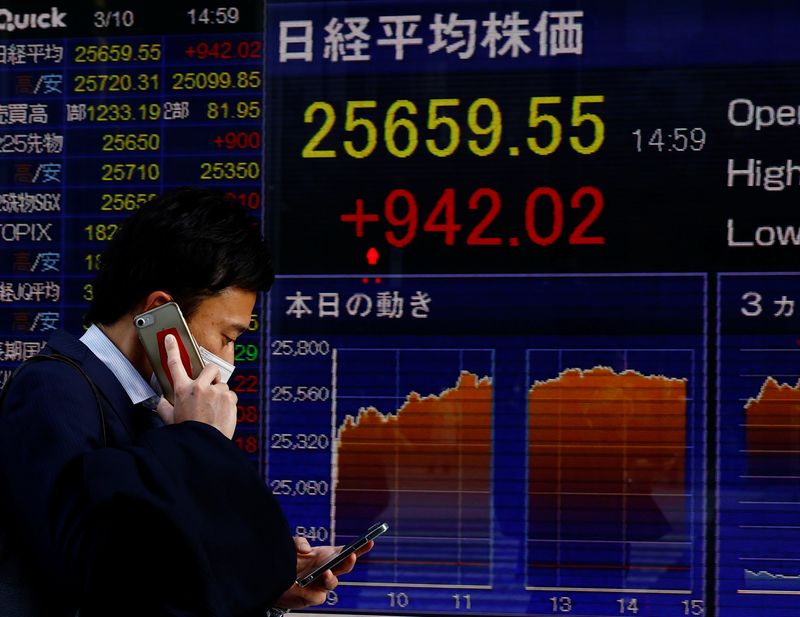 © Reuters. FILE PHOTO: A man wearing a protective mask, amid the coronavirus disease (COVID-19) outbreak, walks past an electronic board displaying Japan's Nikkei index outside a brokerage in Tokyo, Japan, March 10, 2022. REUTERS/Kim Kyung-Hoon
© Reuters. FILE PHOTO: A man wearing a protective mask, amid the coronavirus disease (COVID-19) outbreak, walks past an electronic board displaying Japan's Nikkei index outside a brokerage in Tokyo, Japan, March 10, 2022. REUTERS/Kim Kyung-Hoon
By Stella Qiu and Tom Westbrook
BEIJING (Reuters) - Asian shares tumbled on Friday as investors fretted about an increasingly aggressive rate-hike outlook for the United States as well as the fallout for the global economy from lockdowns in China.
MSCI's broadest index of Asia-Pacific shares outside Japan fell 1.1% in morning trade, its sharpest decline in six weeks.
Pulling it lower was a 1.6% loss for Australia's resource-heavy index, a 1.1% drop in Hong Kong stocks and a 0.3% retreat for blue chips in mainland China.
Japan's Nikkei lost about 2%.
Overnight, U.S. Federal Reserve Chairman Jerome Powell said a half-point interest rate increase will be "on the table" when the Fed meets in May, adding it would be appropriate to "be moving a little more quickly."
His remarks effectively confirm market expectations of at least another half-percentage-point rate hike from the Fed next month, and Nomura now expects 75 basis point hikes at its June and July meetings, which would be the biggest of that size since 1994.
U.S. Treasuries continued to be sold off on Friday, with the yield on five-year Treasury notes rising to 3.04%, the highest late 2018. The yield on 10-year Treasury notes was at 2.9483%, up from the previous close of 2.9076 and not too far off from 2.9810% - a 40-month high marked on Wednesday.
The two-year yield, which reflects traders' expectations of higher Fed fund rates, touched 2.7408%, up from a close of 2.6739% the previous day.
Elsewhere, markets were still reeling from comments by European Central Bank officials that the central bank might start hiking euro zone rates as early as July. German two-year yields hit an eight-year high overnight.
Pan-region Euro Stoxx 50 futures fell 2.33% in early Asian trade, German DAX futures were down 1.87% and FTSE futures were down 1.39% - particularly large falls for the Asian timezone.
The prolonged lockdown in Shanghai and its impact on the world's second-largest economy have weighed on local stocks and the Chinese currency.
Citi analysts said that they believed lockdowns in China are likely to reinforce upside inflation pressures in coming weeks and months.
"We continue to think those inflation concerns will weigh on currencies with dovish central banks," they wrote in note.
The U.S. dollar was little changed on Friday against a basket of major currencies, although it stayed comfortably above 100, buoyed by rising U.S. Treasury yields.
The greenback gained 0.2% against the Japanese yen, as the Fed's increasingly hawkish posture stood in even sharper relief to Bank of Japan's ultra easy policy.
The Chinese currency yuan hit a fresh seven-month low of 6.4748 in early trade onshore. It tumbled through its 200-day moving average earlier this week.
Powell's comments overshadowed robust U.S. corporate earnings and jobless claims data that showed the number of Americans filing new claims for unemployment benefits fell last week, suggesting that April was another month of strong job growth.
The Dow Jones Industrial Average ended down 1.05%, while the S&P 500 lost 1.48% and the Nasdaq Composite dropped 2.07%.
Oil prices wobbled on Friday as concerns about supply due to a potential European Union ban on Russian oil were offset by demand worries. Brent crude fell 1% to $107.17 per barrel, while U.S. crude fell 1% to $102.68 a barrel.
Looming rate hikes weighed on gold. Spot gold was last down 0.12% to $1,949.58 per ounce.

